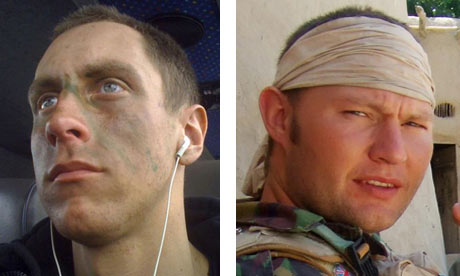Mother of 200th soldier to die tells politicians to 'get out on the frontline' Private Richard Hunt and Sergeant Simon Valentine, the 200th and 201st British soldiers killed since the Afghanistan invasion. Photograph: Press Association/Ministry of Defence British forces in Afghanistan have suffered the bloodiest month since the US-led invasion in 2001, it emerged today, fuelling growing fears in Whitehall that the government is struggling to shore up public support for the military campaign. As Bob Ainsworth, the defence secretary, insisted that the war against the Taliban was "winnable", official figures revealed that there were 94 British casualties in July, double the number in June and four times as many as in May. Of these, 31 were very seriously wounded – meaning they had life-threatening injuries – or had serious wounds. The number of casualties so far this year has already passed the total for the whole of 2008. The pressure on ministers was further increased when the mother of the 200th Briton to die in combat called on politicians to "get out on the frontline" themselves so they could see how desperate troops were for resources. Hazel Hunt, whose son Private Richard Hunt, 21, died from bomb blast injuries in Selly Oak hospital in Birmingham on Saturday, said: "They should get off their backsides and see what it's like for our boys out there. The army has been short-changed and the troops are suffering because of it. But the politicians are not listening to the troops on the ground." Amid growing fears in Whitehall that public support for Britain's involvement in Afghanistan is waning, the Ministry of Defence attempted yesterday to explain the spike in casualties by outlining the shift in Taliban tactics. Lieutenant General Simon Mayall, the deputy chief of defence staff, said Taliban commanders had attacked British forces in Sangin in northern Helmand province after last month's successful Panther Claw offensive in the central part of the province. Mayall said: "It is a question of commanders using the assets at their disposal at the point of main effect. The Taliban are inevitably moving to areas where they are under less pressure." The intervention by Mayall will intensify pressure on ministers, who are concerned that public support for the military operation is waning. Ainsworth claimed yesterday that progress was being made on the ground. "We can get this country to a place where they are able to protect their own security and prevent the Taliban's return." But he found himself at odds with the military yesterday over how long British forces would remain in Afghanistan. The defence secretary said he hoped that "in the next year or so" sufficient progress would be made to allow the Afghan army to take a greater role. But the outgoing head of the army, Sir Richard Dannatt, immediately cast doubt on this when he said the British army could be involved in Afghanistan for another five years. "We have got to get it right. It will take a bit of time. We will go on doing, as the military, what we need to do until the Afghan capability is good enough to take over from us," he told BBC News. "That will continue for years. I don't want to put a figure on that, but certainly two to four years, three to five years, of this kind of level of commitment by the military." The tensions in Britain came as Barack Obama reaffirmed his pledge to withdraw US troops from Iraq by the end of 2011 and sought to steel Americans' resolve as he sends more forces to confront the Taliban. The president moved to shore up public support for the military action in Afghanistan when he said the conflict was a war of necessity. "Those who attacked America on 9/11 are plotting to do so again," he said. Warning that the Taliban would not be defeated quickly, he said: "As I said when I announced this strategy, there will be more difficult days ahead. The insurgency in Afghanistan didn't just happen overnight and we won't defeat it overnight. This will not be quick, this will not be easy." Britain believes that General Stanley McChrystal, the new US commander in Afghanistan, will ask for more resources when a review is published next month after this week's Afghan elections. "It is absolutely the best opportunity to create a better outcome for the Afghan people," Mayall said of the prospect of an increase in security forces in Helmand.Bloodiest month for British troops as ministers defend Afghanistan campaign

Tuesday, 18 August 2009
Posted by
Britannia Radio
at
19:43
![]()





















